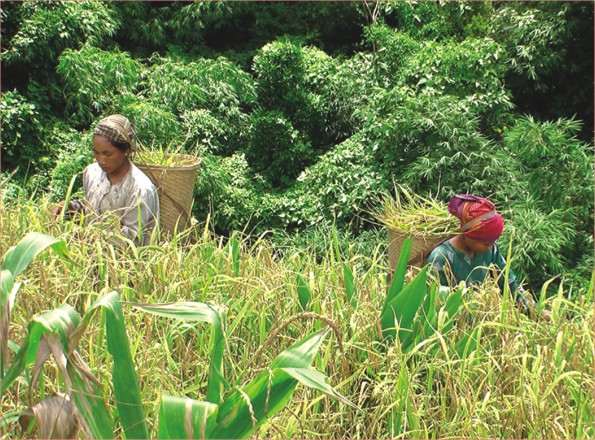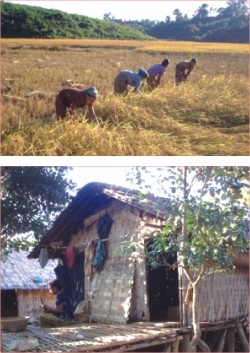| Journey through Bangladesh
From Khagrachhari
Lakpaindang Stuck in the Past
Jasim Majumder

Lakpaindang is a remote and inaccessible village under Manikchhari upazila in Khagrachhari district. It is still detached from the rest of the country and is unfamiliar with the human rights that are recognised elsewhere.
Situated some 15 km off Manikchhari upazila headquarters and more than 50 kilometers from the district town Khagrachhari, the large village of 13 square kilometers under Manikchhari Union is inhabited by some 5,000 Marma people.
Deprived of all civic amenities, the villagers here live a hard, technologically backward, life. They maintain their livelihood either by collecting and selling firewood as well as farming, they said.
Most of their houses are made with straw, wood or bamboo. There are no paved roads in this village yet and to sell firewood and other products or to buy essential commodities, the villagers have to walk all the way to the nearest market at Manikchhari, Gachhabil or Tintahari Bazaar which are 15 to 20 kilometers away. The local bazaars sit only once a week.
The villagers claim that the Chittagong Hill Tract Development
Board (CHTDB) has undertaken a project to pave a road costing taka 25 lakh taka but the project was halted after only two kilometers.
The villagers have nothing to do about this and they suffer from the lack of food and clothes during the rainy season, said Aungshipur Marma, 60.
There is no tube-well or any other drinking water arrangement. The villagers have to collect water for drinking and other household needs from the natural wells but it's a lot of trouble. Water-borne diseases are widespread.
 The people here have no idea about modern medicine or treatment. They depend on the 'baidya' for treatment and surrender themselves to Bhagwan when they fall sick. Many die due to malpractice from the so-called healers, who they trust because of their superstitions, said Sathaaung Marma. The people here have no idea about modern medicine or treatment. They depend on the 'baidya' for treatment and surrender themselves to Bhagwan when they fall sick. Many die due to malpractice from the so-called healers, who they trust because of their superstitions, said Sathaaung Marma.
Local lawmakers, government officials and even the representatives of the local government hardly know about the existence of this village so there's no way to come to the aid of these people.
Education hasn't really reached this village; there is no proper school here. The people of this area, with the assistance Karitas, an NGO, set up a primary school in the village in 2000. Three teachers from Manikchhari were appointed to teach poor indigenous children here. They walk 9 kilometers to get to the school from Manikchhari, the locals said.
The school is hanging on by a thread and it might have to stop its operations because they can't pay their teachers well and it is impossibly difficult to get to the school, they said. In the rainy season, teachers or students don't even bother going.
The nearest primary school is Manikchhari Government Primary School area, 10 km away from Lakpaindang and it is very difficult for children to attend classes there everyday, said Mrashathowai Marma, a villager.
For lack of education, superstitions have gripped the people of Lakpaindang. Early marriage is a common occurrence here. Kids get married in their early teens and this is very risky for the girls.
The prospects for development of the village in the near future seem bleak. Shaktipada Tripura, president of Headman Associations said that Chairman Abul Kalam Azad has been awarded for his outstanding contribution to his union but at least 3 villages are still in the dark, and he can't do anything. “We want to bring some changes to Lakpaindang. But, it would not be possible if the village is detached like it is now”, he said.
Khagrachhari Hill District Council (KHDC) Member Sanu Mong Marma recently visited the area and saw the miserable condition of the Lakpaindang village. He said he submitted a proposal to his office.
Mrasathowai Marma, Advisor of Bangladesh Marma Aikka Parishad (BMAP) said they were working to build awareness in this area regarding education, health, human rights and responsibilities. They are producing crops and vegetables in these areas. They say if there is a road for communication and a school for learning then the environment could rapidly change.
Copyright
(R) thedailystar.net 2008
|

